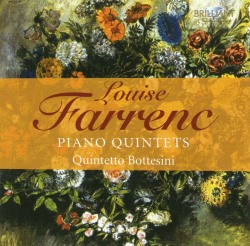|

|
Louise FARRENC (1804-1875)
Piano quintet No.1 in A minor, Op.30 [28:30]
Piano quintet No.2 in E, Op31 [31:23]
Quintetto Bottesini (Alessandro Cervo (violin), Federico Stassi (viola), Amedeo Cicchese (cello), Roberto Della Vecchia (double bass)); Linda De Carlo (piano)
rec. Teatro Torti, Bevagna, Perugia, Italy, 5-8 October 2013.
BRILLIANT CLASSICS 94815 [60:01]
The booklet notes for this disc rightly remind us that performing, and to an even greater extent composing, music were considered a uniquely male preserve in the nineteenth century and before. We know of Clara Wieck because of her marriage to Robert Schumann but there were many more women who played and composed including Fanny Mendelssohn and the subject of this disc, Louise Farrenc. They did not have an easy time of it and even Schumann who had had to fight to be able to marry Clara then did all he could to discourage her from continuing to pursue music as a career as did Mendelssohn with regard to his sister. It was ironic that Robert Schumann still found he was able to praise one of Louise Farrenc’s compositions in 1836.
A search on Wikipedia reveals screeds of women composers from the earliest times including twenty from before 1500, including Hildegard of Bingen (1098-1179). A disc of her music, the phenomenally successful A Feather on the Breath of God has, since its release in 1985, managed to establish the fact that women have always composed music just as men have; it is a human need that knows no gender.
Louise Farrenc is a really interesting composer who, though she made quite a name for herself during her lifetime. She became a full professor of piano at the Paris Conservatoire and her 30 Grandes Études dans tous les tons majeurs et mineurs were accepted by it as a standard reference work. That said she fell into relative obscurity after her death. As the booklet notes explain, part of the reason is likely to be that her music was composed at a time when Classicism was giving way to Romanticism and that France has never given sufficient support to its own composers. This despite the fact that Hector Berlioz whose life almost mirrored hers in terms of dates (1803-69) seems to have fared much better. I think it has as much to do with her being a woman as anything else. Part of the reason for the success she did enjoy was due to the fact that her husband, whom she married aged 17, founded a publishing house that helped bring her music to the public’s notice. This showed that it was so good as these two piano quintets demonstrate very clearly.
The line-up for her piano quintets is unusual by including a double bass when the norm is to include two violins. The booklet note writer reminds us that this was the same configuration used by Schubert for his Trout Quintet. The booklet also indicates that Farrenc intended the quintets to complement each other, presenting as they do an interesting contrast. The first is rather austere though not without some sunnier moments, while the second is an altogether more relaxed and light-hearted affair with plenty of sparkle.
Today we live in an age when new music and more avant-garde approaches to composing do not eclipse that which has gone before. We are able to view everything on its own merit, a situation that has enabled the music of many a forgotten figure to emerge from the shadows. Louise Farrenc is one such and these two works reveal a wonderfully tuneful composer about whom three years after her death the musicologist Adolphe Jullien wrote ‘As a woman she has left us, but the teacher lives on in her pupils and the composer in her works’. These two quintets are glowing testimony to that.
The Quintetto Bottesini has done great service to Farrenc with superbly warm performances that allow the music to breathe. They were formed with the specific aim of digging out works for this unusual combination and, indeed are named after double bass player and composer Giovanni Bottessini. They have found and performed many works for this line-up by a disparate collection of composers that encompasses Hummel and Vaughan Williams. It also includes works by Piazzolla as well as those composed especially for them by several contemporary Italian composers.
Steve Arloff
 |
 |
|



 All Nimbus reviews
All Nimbus reviews








